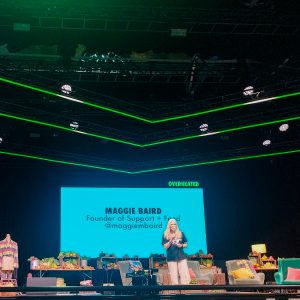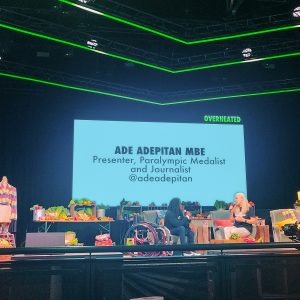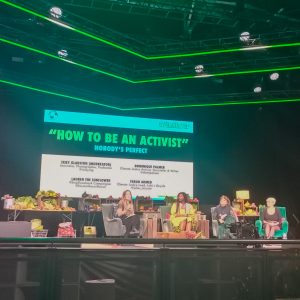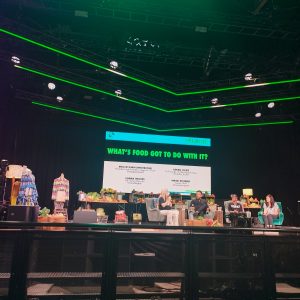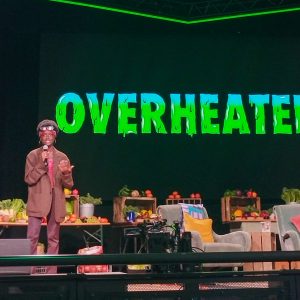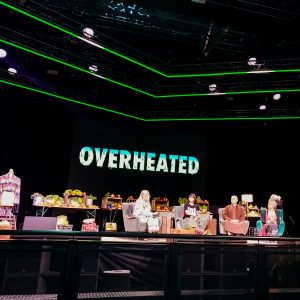Overheated with Billie Eilish:
environmental leaders, musicians, and designers come together to discuss the pressing issue of the climate crisis.
We had an incredible experience attending the Overheated event with Billie Eilish in London on August 30th. The event brought together a diverse group of activists, artists, chefs, musicians, and actors united by their passion for the climate movement. We discussed a wide range of topics, from how to cope with climate anxiety to becoming an effective activist, as well as the impact of the food industry, fashion, and arts on the environment.
The event was expertly hosted by Abbie McCarthy, an award-winning TV and radio presenter and DJ. Maggie Baird, founder of @supportandfeed and mother to Grammy-winning artists Billie Eilish and Finneas, was also in attendance, lending her valuable insights to the conversation. A major highlight was Billie Eilish herself, who shared her thoughts on how we can all make a difference by choosing to buy clothing sustainably. It was an inspiring and eye-opening discussion that kept us hopeful and motivated to act.
The event took place at Flipper’s Roller Boogie Palace. The panel sessions were followed by an opportunity to roller skate, with a live DJ playing and Flipper’s staff training beginners. It was a moment to embrace climate joy after discussions around eco-anxiety.
A summary of each session that will hopefully leave you feeling as inspired to act as we did.
Introduction
The Buddhist monk Brother Spirit invited the audience to practice mindfulness and connect with one of the major elements of this planet: water. Paying attention to this precious element and how we consume it frames a reminder to preserve our environment before opening the conversations about climate change.
Conversation
Maggie Baird (founder of Support and Feed), Ade Adepitan, (paralympic medalist and British television presenter).
Maggie and Ade shared their experiences of travelling around the world and witnessing the impact of climate change in different ways. Adepitan highlighted how climate change was acknowledged decades ago and that we’ve been in this mess since industrialisation. We’re all feeling the impact of climate change since we live in an interconnected world. We’re conscious of the natural disasters unfolding and their impact on people, and even though science is there to mitigate climate change, there’s still a lot we should do.
When asked what climate challenges or stories stood out to him from his travels, Adepitan mentioned Australia, where people are still navigating the effects of climate change, such as wildfires and increased desertification, and their consequences. He then reminded the audience that we must listen to people from frontline communities because they’re often the most affected by and least responsible for climate change. As active community members, we must challenge our leaders to seek climate justice.
But how do we stay hopeful? Adepitan suggests that we acknowledge that overconsumption is a big part of the problem and adjust our lives according to our environment. We must mimic our planet’s actions and respect the environment and its processes.
First Panel: How to Become an Activist – Nobody’s Perfect
Featured: Issey Gladston (Journalist, Photographer and podcaster) as moderator, Dominique Palmer (Climate Justice Activist, Storyteller & Writer), Lauren the Sunflower(#StopRosebank Campaigner) and Farah Ahmed (Climate Justice Lead, Julie’s Bicycle)
During the panel discussion, all the participants talked about their involvement in various movements, organisations or campaigns. They shared their journey of becoming activists and discussed their initial career steps. They also shared their individual definitions of the word ‘activist’ and “how to start on this path”.
Issey, Dominique, and Lauren embarked on their professional journeys after realising the seriousness of the climate crisis at a young age. They observed how this crisis affected our way of life and understood that no significant changes were in place to address it. Climate justice involves recognising that the impacts of the climate crisis are not uniform and that marginalised communities are particularly vulnerable to its effects due to systemic oppression. They participated in various activities such as joining climate protests, working behind the scenes, running social media, handling logistics, live streaming events, and organising climate strikes. As time passed, they discovered that their personal stories and the power of storytelling could be harnessed to engage more people in the subject of the climate crisis and became more active in their movement.
With a background in fashion design, Farah had a different perspective on climate crisis discussions. Farah started a career in Julie’s Bicycle, not knowing much about climate change. Through time, Farah learned from colleges and absorbed what was happening around the community. Farah’s involvement in climate justice became more pronounced.
The panel conveyed an important message that there are multiple ways to become an activist and demystify the process of getting involved in a movement. Being an activist doesn’t mean being in the spotlight or leading on the stage; it can simply involve taking any possible action to bring change equitably. Activists come from various backgrounds and possess different skills contributing to making a difference within the justice frame. The major advice from all panelists was to start by joining a small or local community movement.
Second Panel: What’s Food Got To Do With It?
Featured: Moderated by Maggie Baird, with panelists Robbie Lockie (Co-Founder of Plant-based News), Gemma Hoskins (UK Senior Director), and Omar McQueen (Vegan Chef).
Panelists talked about how the food industry is often left out of conversations about climate change and how the meat industry has a significant impact on the environment. They shared surprising food industry data and how certain products are marketed deceptively to push a false narrative about health in pursuing profits.
Prioritizing the taste of our food as consumers, without considering its impact on the environment, was discussed by the panelist and we can contribute by choosing to incorporate more vegetables and plant-based products into our diets. The panelists recommend educating ourselves on the subject and exploring our creativity when cooking our meals to make it a fun experience. Doing so can ensure that we enjoy our food while caring for the environment.
Presentation: Choked Up’s Journey towards the Environmental Movement and Campaigns
Featured: Beau Boka-Bates, co-founder of Choke Up
Beau Boka-Bates shared Choked Up’s journey towards the environmental movement and campaigns that stress the importance of understanding and acting in favour of climate justice. Beau also shared a beautiful poem named “ I Speak the Language of Clean Air.”
Third Panel: Eco-Anxiety
Featured: Alice Aedy (documentary filmmaker and CEO of Earthrise Studio) (Tori Tsui, an activist and author), Brother Spirit (Buddhist monk), Koteka Wenda (Free West Papua Campaign)
This panel focused on how everyone can navigate climate anxiety through music, culture, community, and other means. It is normal to have a response to the climate crisis, and the psychological response should be recognised. However, it is important not to feel overwhelmed. Rather than disconnecting from the situation, we should learn to have compassion and recognise the suffering of communities affected by the climate crisis. This can drive us to take action and enhance our connection to our community by being fully present in our emotions and those of others.
Fourth: Ethical Fashion
Featured: Moderated by Samanta Pattinson(Cultural Sustainability Pioneer). Panelists: Liv Simpliciano (Fashion Revolution), Jennifer Drouguette Espinosa (founder and creative director of Anciela), and Skakaila Forbes-Bell (master’s degree in fashion psychology).
The conversation revolved around the fashion industry’s impact on the climate crises and injustice and how clothing plays a psychological role in shaping our identity as individuals and our consumer decisions. The panelists presented data on the fashion industry and its production of clothing, followed by ways to detach ourselves from consumerism while having fun and increasing our creativity while enjoying fashion. The panel highlights were the insights provided on the fashion industry and the call to action for individuals to take responsibility for their consumer choices.
Final Panel: Looking through an Optimistic lens
Featured: Moderated by Joycelyn Longdon (Cambridge University PHD Candidate and Founder of ClimateinColour). Panelists: Tamsin Edwards (Professor in Climate Change) Kalpana Arias ( Technologist, urban greening activist, gardener and food-growing educator) Daze Aghaji (Climate justice activist, artist and consultant), Fatima Ibrahim (Co Executive Director of Green New Deal UK).
In this session, the panelists highlighted good news in the fight against climate change. It is easy to forget big wins and to focus instead on disasters that have occurred worldwide as a result of climate change. However, we can find hope by avoiding oversimplified explanations of the state of climate change and to remind ourselves that positive change through meaningful solutions are happening, too. We can hold onto the hope, process, work, plans, and potential of the actions being taken to address climate change. However, we must also recognise the need to do more and act faster if we want to achieve our environmental targets. Therefore, it is crucial to acknowledge and promote the progress and good news that recognises the efforts of those working towards a better world.
Closing Conversations
The topic of ethical fashion was also the focus of an exciting and fun conversation between Billie Eilish and Maggie Baird. Billie discussed her love for thrift shopping and vintage stores and how it reflects her personality. She doesn’t feel the need to showcase brands or wear new clothes frequently. Instead, she prefers to reuse the clothes she buys and regards washing and reusing. Billie believes in the idea that we buy clothes because we like them and should use them for as long as we want. Her style and creativity in picking her clothing while thrifting or exploring vintage stores were highlighted to disclose the message of how inspiration and personality are key to successfully picking a piece of clothing. The conversation ended with suggesting the idea of swapping or donating clothes once they are no longer needed to improve the lifespan of clothing.
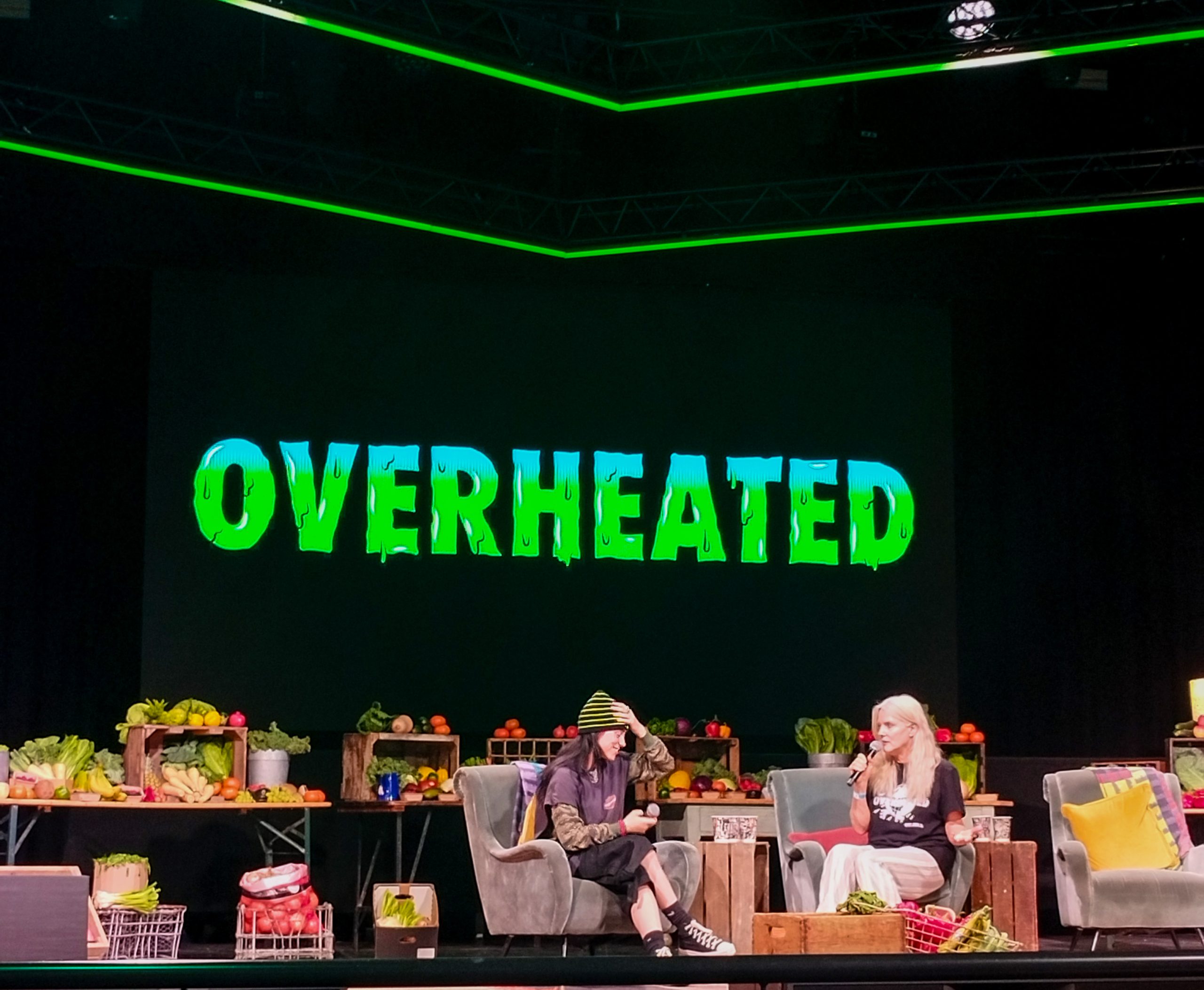
During the event’s closing, Reverb discussed how they are shifting the music industry to become more sustainable through a number of means, such as using clean energy and providing plant-based food at shows to decarbonise the industry. For example, Billie Eilish’s presentation at Lollapalooza 2022 was powered largely by solar energy.
Before the roller skating session, there was a significant amount of content focused on climate action. We were fortunate to hear inspiring messages from two incredible individuals during the event: Daphne Frias, an advocate for climate and disability justice, and Grace Gibson-Snyder, a student who successfully sued the state of Montana for its failure to protect the environment. We hope that Overheated returns for a third consecutive year in 2024, and I highly recommend attending in person or watching the live stream to gain access to the valuable information they shared.
If you’re interested in learning more about climate change, please visit the topic on our system map. You can also find related subjects in that location, such as climate justice.
Don’t miss out on our latest updates! Follow us on social media and check out our Energy 101 posts for more information on climate change and clean energy.
